
(L to R top to bottom) Lucy Powell, Michelle Donelan, Angus Robertson, Julian Knight, Lord Parkinson.
Photo: Chris McAndrew, David Woolfall, Scottish Government, Roger Harris, Roger Harris
Who’s who in cultural policymaking?
With so much churn in government over recent months, it’s been hard to keep track of who's in charge of the UK's cultural policy. Lillian Race and Ruth Hogarth have assembled a guide to the movers and shakers in the Houses of Parliament and the devolved Assemblies.
Policymaker is a broad term covering everyone with responsibility for formulating or amending policy. At a national level, it includes Ministers, their advisors and civil servants, as well as Commons Select Committees and All-Party Parliamentary Groups. Arts and culture policymaking is devolved to the national assemblies of Scotland, Wales and Northern Ireland.
A year of political turmoil in the Conservative Party has led to a number of reshuffles in cabinet and changes in key cultural policymakers. As we enter 2023, we have taken stock of who now has responsibility for determining the future of the arts sector. Most of them are very new appointments. Here’s who to keep an eye out for.
Secretary of State for Digital, Culture, Media and Sport (DCMS)
Michelle Donelan is Conservative MP for Chippenham and Secretary of State at DCMS.
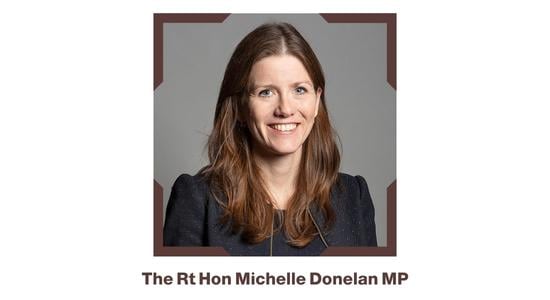 Photo: David Woolfall
Photo: David Woolfall
The most senior cultural policymaker, Donelan was first appointed by former PM Liz Truss in September 2022. PM Rishi Sunak kept her in post making her the 11th person to hold the role in just over a decade and the first DCMS Secretary of State to serve consecutively under two Prime Ministers. Donelan has announced plans to take maternity leave this year so we may yet see a 12th incumbent.
In her first significant policy change, Donelan has called for the reversal of plans to privatise Channel 4.
Parliamentary Under Secretaries of State at DCMS
These are the two key figures for the arts and culture sector in DCMS.
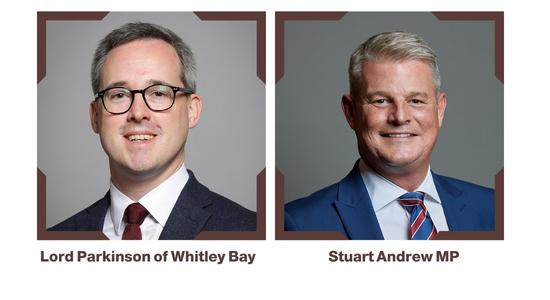 Photo: Roger Harris, Roger Harris
Photo: Roger Harris, Roger Harris
Lord Parkinson of Whitley Bay was appointed Parliamentary Under Secretary of State at DCMS (Minister for Arts and Heritage) in October 2022, having already served for a year as Minister of Arts. He is also the spokesperson for DCMS, responsible for promoting and defending departmental policies.
He is supported by Stuart Andrew, Conservative MP for Pudsey, who was appointed Parliamentary Under Secretary of State at DCMS (Minister for Sport, Tourism and Civil Society), also in October 2022.
Shadow Secretary of State at DCMS
On the opposition benches, Lucy Powell, Labour MP for Manchester Central, was appointed Shadow Secretary by Keir Starmer in November 2021 during Boris Johnson’s premiership.
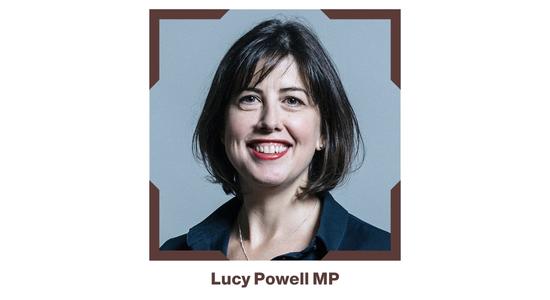 Photo: Chris McAndrew
Photo: Chris McAndrew
Powell was vocal in her demands for the government to explain the last-minute delay to the announcement of the new National Portfolio back in November.
Devolved Assemblies
Policy and legislation relating to arts and culture is devolved to the National Assemblies of Scotland, Wales and Northern Ireland. This includes issues relating to tourism, sport and heritage, but media-related policy typically remains under the scrutiny of Westminster. These are the key players in the devolved parliaments.
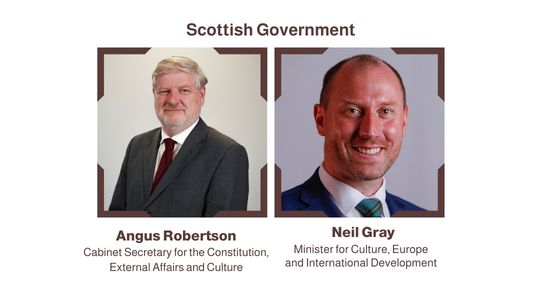
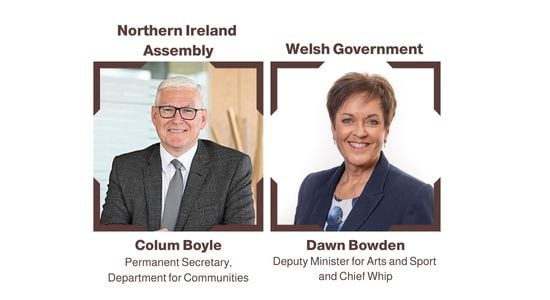 Photo: Scottish Government, Scottish Parliament, Department for Communities, Welsh Parliament
Photo: Scottish Government, Scottish Parliament, Department for Communities, Welsh Parliament
Scotland's Culture Secretary Angus Roberston is Scottish National Party MSP for Edinburgh Central elected in 2021, when he was also appointed Cabinet Secretary for the Constitution, External Affairs and Culture. Previously, he served as a Westminster MP (SNP) for Moray from 2001 to 2017. He is supported by Neil Gray, Scottish National Party MSP for Airdrie and Shotts since March 2021. Gray was appointed Minister for Culture in January 2022.
In Northern Ireland, in the absence of an elected Executive, cultural matters are managed by the Department of Communities, where Colum Boyle is Permanent Secretary appointed in April 2022. In Wales, Dawn Bowden is Labour Party Member of the Senedd for Merthyr Tydfil and Rhymney in the Welsh Parliament. She was appointed Deputy Minister for Arts and Sport in May 2021.
Permanent Secretary at DCMS
Sarah Healey was appointed Permanent Secretary at DCMS in April 2019 and is responsible for the department’s overall management and leadership of civil servants.
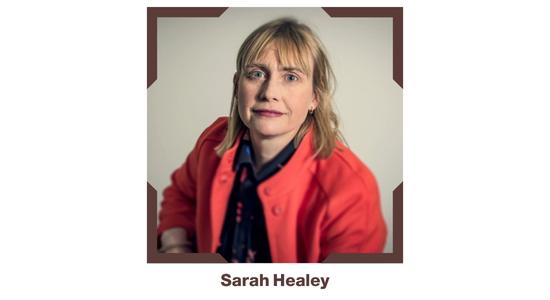 Photo: UK Government
Photo: UK Government
Commons Select Committee: Digital, Culture, Media and Sport
The main scrutiny of cultural policy takes place in the Commons Select Committee for DCMS, led by Acting Chair Damian Green MP. The substantive Chair, Julian Knight MP, has been suspended from the Conservative Party after an unspecified complaint to the police and now sits as an Independent. Fellow committee member Rupa Huq MP also sits as an independent MP following her suspension from the Labour Party pending an investigation into alleged racist comments.
The current make-up of the DCMS Select Committee is as follows:



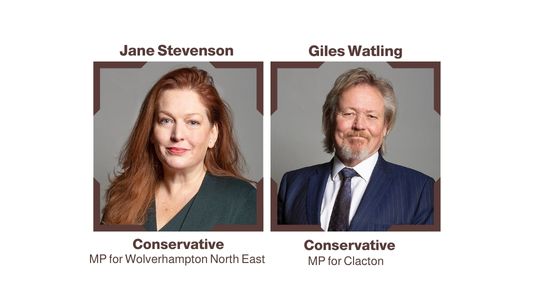
Photo: David Woolfall, Richard Townshend, Chris McAndrew, Chris McAndrew, Chris McAndrew, Richard Townshend, Chris McAndrew, David Woolfall, John Nicolson, David Woolfall, David Woolfall
Most recently, the business of the committee has been focused on the future of the national lottery and cultural placemaking and the levelling up agenda with government responses due early this year.
All-Party Parliamentary Groups (APPGs)
APPGs bring together MPs and peers from across the political spectrum to work together on topics of mutual interest, raising awareness of relevant issues and making recommendations to government.
In the arts sector, they are focused on communicating the importance of the creative industries and in sustaining a vibrant cultural ecology across the four nations of the UK. The main APPGs working in the arts and cultural sector are:
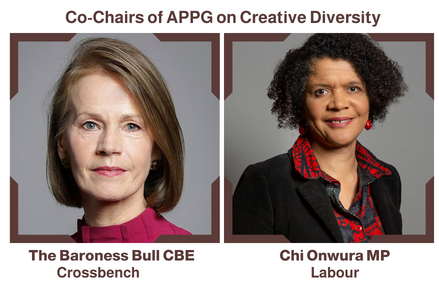
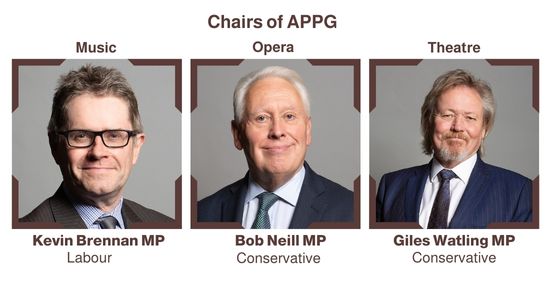
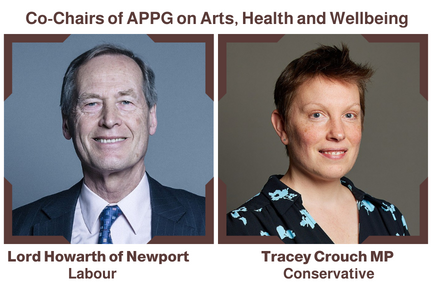 Photo: Richard Townshend, Richard Townshend, Chris McAndrew, Roger Harris
Photo: Richard Townshend, Richard Townshend, Chris McAndrew, Roger Harris
What next for cultural strategy?
The government has previously said it would publish a ‘sector vision’ setting out its strategy for the creative industries sector. Initially due for publication in 2021, it has been delayed until this year. In the interim, the Lord’s library published a briefing in December 2022 which reviewed the most recent developments in the formation of government strategy for the arts and creative industries. The full report is here.
The last definitive government publication on cultural policy was in 2015, covering the years of the coalition government under David Cameron. It states: “We recognise the importance of freedom of expression in the arts, which is why decisions about which cultural organisations and projects receive public funding are made independently (or at ‘arm’s length’) from government.” That principle of policymaking has been severely tested in the last few years. We must continue to challenge it in 2023.
Lillian Race is Digital Content Assistant at Arts Professional.
Ruth Hogarth is Editor at Arts Professional.
![]() @artspro | @lilsrace | @ruthhogarth
@artspro | @lilsrace | @ruthhogarth
*This story was updated on 13 January to reflect the appointment of Damian Green as Acting Chair of the DCMS Select Committee.
Join the Discussion
You must be logged in to post a comment.